Nearly 400,000 Americans told the Federal Trade Commission about credit card fraud in 2021. This is a type of identity theft. Criminals use your name to buy things or take out money.
They can do this with your existing account, stolen cards, or your account numbers. They can even open new accounts in your name. This fraud can hit your credit score. How? By raising your debt, missing payments, or opening new accounts fraudulently.
But, you are not stuck with the bill. The Fair Credit Billing Act says you’re only responsible for $50. If you act fast and tell your card company, put a fraud alert, and watch your credit, you can stop the worst of it.
Key Takeaways
- Credit card fraud is a serious issue, with nearly 400,000 Americans reporting it in 2021.
- Fraudsters can use stolen cards, account information, or open new accounts in your name to make unauthorized charges.
- These fraudulent activities can negatively impact your credit score through higher balances, missed payments, and new accounts.
- The Fair Credit Billing Act limits your liability to $50 for unauthorized charges, but you need to report fraud promptly.
- Proactive steps like monitoring your accounts, placing fraud alerts, and working with creditors can help mitigate the effects of credit card scams.
What Is Credit Card Fraud?
Credit card fraud involves bad people getting and using your credit card info for their gain. They do this to make purchases without your permission. It can happen in many ways like stealing your card, taking over your account, copying your card, or stealing your card details to buy things without actually having the card. Knowing how these scams work is key to keeping your money safe.
Card Theft
One simple way fraud happens is someone taking your card without you knowing. If this happens, a thief can buy items or get cash using your name. This is a big worry because it means somebody has direct access to your money.
Account Takeover
With an account takeover, bad folks get your credit card info in sneaky ways. They might use fake emails or take advantage of security mistakes to get this info. Then, they can use the info to get into your account without physically having your card. And they can start buying stuff on your account.
Cloned Cards
Card cloning is another tricky method. It happens when crooks place a special device on an ATM or payment machine. This device copies the info from your card’s magnetic strip. With this info, they can make a new card and use it to buy stuff in your name without you knowing.
Card-Not-Present Theft
Card-not-present fraud is when thieves use your card details (from online hacks or fake emails) to buy stuff without having the physical card. They do this by buying stuff online, over-the-phone, or setting up recurring payments.
Learning about these credit card scams helps you know what to look out for. It prepares you to protect your money and avoid being a victim.
How Credit Card Fraud Can Impact Your Credit
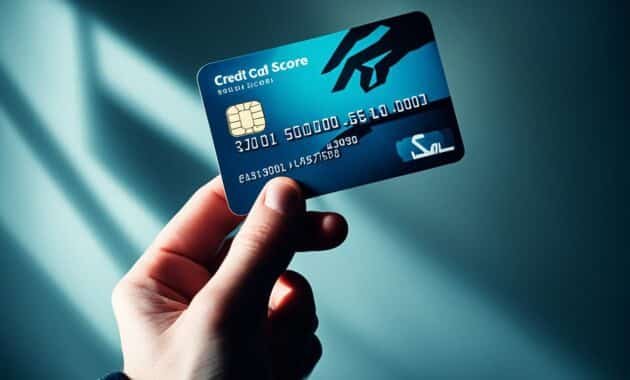
Credit card fraud can harm your credit in a few ways. Fraudulent charges make your card balances and credit utilization go up. This can lower your credit scores. Also, late or missed payments on these accounts hurt your payment history, which affects how creditworthy you seem.
If someone opens new credit card accounts in your name, it can hurt your scores too. The hard inquiries and new accounts lower your scores. Luckily, the Fair Credit Billing Act means you’re not fully responsible for this. You can also ask creditors and credit bureaus to remove any fraud info from your reports.
Higher Credit Card Balances
Having unauthorized charges can max out your cards fast. This raises your balances and credit utilization. Your credit scores can drop because of this.
Late or Missed Payments
Thieves might not pay for the new cards they opened in your name. The late or missed payments get reported, and this hurts your payment history. It makes your credit scores worse.
Fraudulent New Accounts
Identity thieves might open new cards besides using yours fully. This adds hard inquiries and new accounts to your report. It reduces your average account age and credit scores.
Credit Card Issuers’ Fraud Prevention Measures
To fight credit card fraud, issuers have taken many steps. They keep a close eye on account activity for any strange signs. This way, they can spot and stop fraud early.
Monitoring Accounts for Unusual Activity
Credit card companies use smart tech to track spending. They look for odd changes, like big buys far from home. If they see something, they’ll check with you to make sure it’s legit.
Contactless Cards
Now, a lot of credit cards let you pay with a tap. This is called contactless. It means your card stays with you, and crooks find it harder to steal info.
Virtual Card Numbers
Some cards offer virtual numbers for online buys. These numbers work only once and aren’t the same as your real card. They add a safety layer, keeping your real card safe from online fraud.
With these steps, credit card companies work hard to keep your account safe. They aim to lower the chance of fraud. This helps protect your credit score too.
Steps to Protect Yourself from Credit Card Scams
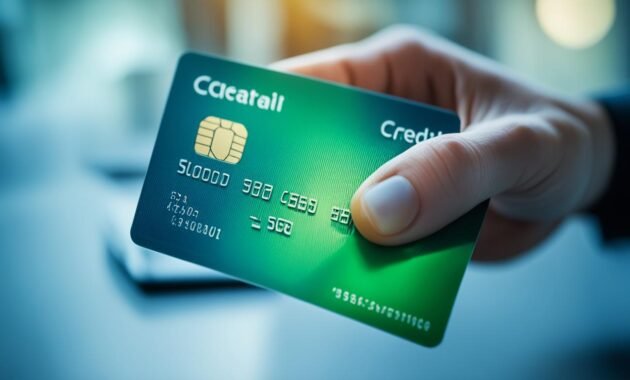
Protecting yourself from credit card scams needs an active approach. By taking key steps, you can lower the risk of fraud on your cards and accounts.
Review Statements Regularly
It’s vital to check your credit card statements often. This helps catch unauthorized charges or strange activity. Checking each transaction closely can spot fraud early and let you act fast with your card company.
Check Credit Reports
Keeping an eye on your credit reports is smart. Look for unknown accounts or inquiries. These could mean someone has stolen your info.
Enroll in Credit Monitoring
Joining a credit monitoring service is a good idea. They can warn you about changes to your credit, like new accounts. This helps deal with fraud quickly.
Secure Physical Cards
It’s key to keep your credit cards safe. Don’t leave them where people can grab them. Always be careful using your card at public places, like ATMs, as they might have skimming devices.
Be Vigilant Online
Be watchful with online buys to keep your card details safe. Don’t share on insecure sites. Watch out for phishing scams that want to trick you into giving info.
Watch for Phone Scams
Beware of phone or text scams too. Scammers might pretend to be from your card company. Always doubt calls asking for card info and never give personal details over the phone unless you made the call.
By following these steps, you can cut your chances of getting scammed. This protects both your credit and money.
Reporting Credit Card Fraud
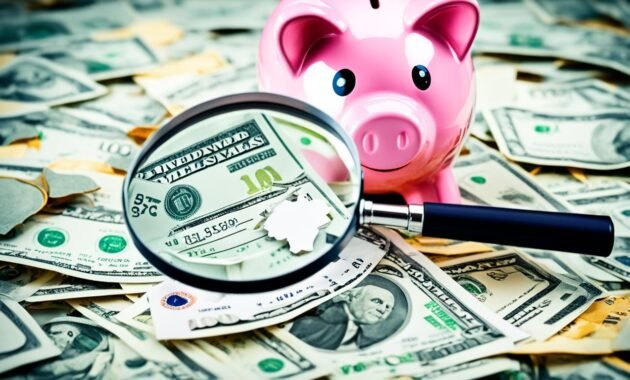
When you spot fraudulent activity on your credit card, let your card issuer know right away. They will stop the card, check into the fraud, and help you not pay for unauthorized charges. Also, tell the credit bureaus to mark your credit report with a fraud alert. This makes it tougher for criminals to open accounts using your name.
Telling law enforcement can aid in finding the stolen belongings. A full plan includes contacting your card issuer, putting a fraud alert, and informing the police. This strategy can lessen the harm of credit card scams and identity theft on your financial security.
| Steps to Take After Discovering Credit Card Fraud |
|---|
| 1. Contact your card issuer right away to report the fraudulent activity and have the card canceled. |
| 2. Put a fraud alert with the credit bureaus to stop criminals from opening accounts in your name. |
| 3. Report the fraud to law enforcement to help with investigation and the chance to get back any stolen items. |
| 4. Watch your credit reports and financial accounts closely for more suspicious activity. |
These steps can lessen the damage of credit card fraud. They help safeguard your financial well-being from the fallout of this kind of financial crime.
Removing Fraudulent Information from Credit Reports
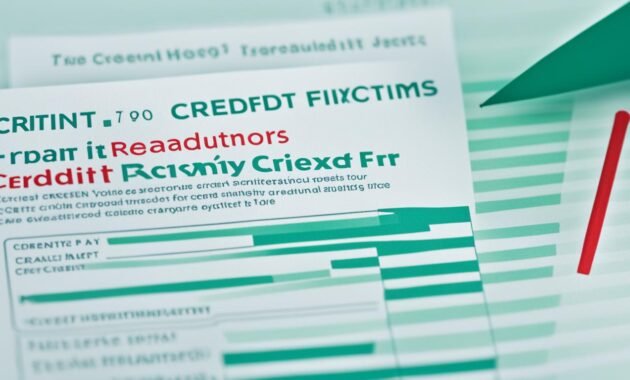
If you spot fraudulent details from credit card scams on your credit reports, take action. Contact both the creditors and credit bureaus to clean your record. This means questioning the wrong items to make sure your report doesn’t show anything fishy like unauthorized charges or card cloning.
Disputing with Creditors
First, reach out to the creditor behind the false entry and ask them to investigate. Tell them your story and show any proof of identity theft or financial crimes. They must look into this and fix any mistakes on your report, according to law.
Disputing with Credit Bureaus
If the creditor isn’t helping, you can go directly to the credit bureaus. Write up your dispute and include any evidence. The bureaus then must check the claim and drop it if they can’t prove it’s true. This is a key step in safeguarding your financial health from the effects of credit card scams or theft.
Credit Card Scams
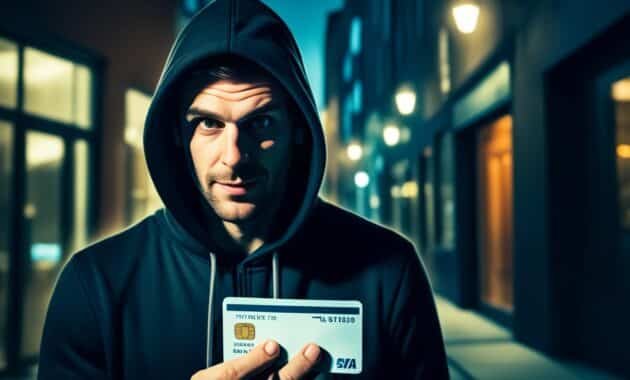
Credit card scams have many faces, from card theft to cloned cards. Scammers want your credit card info to make illegal charges, causing problems like high balances and late payments. Knowing about these scams and taking steps to avoid them is key to staying safe.
Card theft is a big issue where someone takes your card and buys things without you knowing. If you see strange charges on your bill, get new cards you didn’t ask for, or are asked odd questions about your account, you might be a target.
Account takeover is another trick used by scammers. They get into your account and spend money without your okay. Be careful with emails and calls asking for your card details. These could be attempts to steal from you.
Scammers also make cloned cards by copying your card’s details at ATMs or shops. They then use these copies to buy things. If your card details are stolen and used without the physical card, especially online, that’s called card-not-present fraud.
To stay safe, keep an eye on your statements and credit reports. Watch out for suspicious emails too. Always report anything strange to your bank. This can keep your credit score from getting hurt by fraud.
Fraud Alerts and Credit Freezes
Fraud alerts and credit freezes are powerful tools to protect yourself from credit card scams and identity theft. By using these, you can lower the chance of falling victim to fraud. They help keep your financial information safe.
Placing a Fraud Alert
Setting a fraud alert on your credit is easy but very useful. With an alert, lenders must check it’s really you before opening new accounts or changing old ones. It’s a key step in stopping scammers from using your info to get new credit or loans.
Credit Freezes
A credit freeze goes even further by stopping anyone from seeing your credit report. This means scammers can’t open new accounts in your name. It’s a great way to help protect yourself after being a victim of credit card fraud or identity theft. With a credit freeze, there’s less risk of more fraud happening.
Both fraud alerts and credit freezes are simple to set up. They are free and you can do it by contacting Experian, Equifax, and TransUnion. These steps are very helpful in keeping your money safe and dealing with credit fraud, long or short term.
Additional Tools to Monitor for Fraud
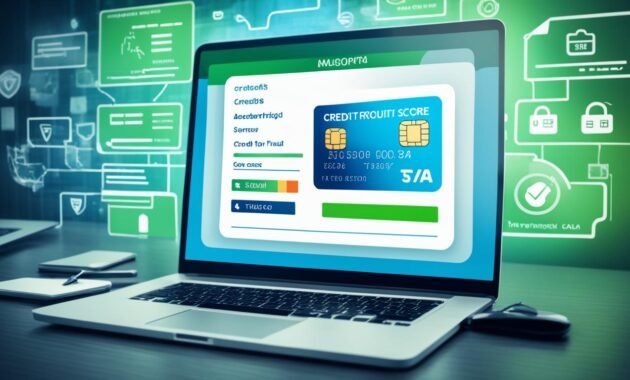
Consumers have more tools beyond credit monitoring to catch possible fraud and theft. One key tool is dark web scanning. It spots if your personal info shows up on the dark web, which is often used by criminals. This can be where stolen data is traded.
Monitoring on people search sites is also important. It checks if your personal details are being shared openly. This can help protect you from identity theft. Using these extra services can add more security against fraud and theft.
Dark Web Scanning
Dark web scanning is crucial in fighting Credit card fraud and theft. It looks on the dark web for your personal info being traded. If it finds anything, you get an alert. This lets you act fast to protect your accounts and credit.
People Search Site Monitoring
Your personal info can be at risk on public search sites. These sites can inadvertently share your sensitive data. Services that monitor these sites look out for your details. If they find anything, you can ask to have your info removed. This step helps lower the risk of criminals getting your information.
Also Read: Secure Your Data With Identity Theft Protection
Conclusion
Credit card scams are real and many fall victims. Nearly 400,000 Americans faced fraud in 2021. Credit card companies try to stop credit card fraud by watching for strange activity, using contactless cards, and offering virtual card numbers.
But, we must also help protect our money. We should check our credit card bills often. Looking at our credit reports is good, too. These steps help lower the risk of credit card scams.
If you’re a victim of credit card fraud, tell your card company fast. Put a fraud alert on your account. And work with your creditors to fix your credit reports.
Knowing about different kinds of credit card scams is useful. Try to stop fraud by taking action against things like lost cards or card-not-present fraud. This way, you can avoid identity theft and financial crimes.
It’s vital to watch out everywhere, both online and off. Use tools like dark web scanning and people search site monitoring. These can add protection against credit card fraud and cybersecurity attacks.
Together, credit card companies and consumers can fight fraud. By working as a team, we reduce the harm from credit card scams. This protects our money and credit scores.
FAQs
What are the common types of credit card scams to watch out for?
Watch out for card theft and account takeover. Also, beware of cloned cards. These are made by criminals using skimming devices. Another common scam is card-not-present fraud. Here, thieves use your online account details without the physical card.
What are the signs that I might be a target of credit card fraud?
If you see unusual charges or any unknown transactions, you might be a fraud target. Also, be careful of strange phone calls or emails asking for your card details.
How can I protect myself from credit card scams?
To protect your cards, review statements often and check your credit reports. Sign up for credit monitoring services. Keep your cards safe and be careful online. Always be wary of phone scammers trying to get your card details.
What steps should I take if I discover credit card fraud?
If you find fraud, tell your card issuer immediately. Also, put a fraud alert on your credit report. Report the crime to the police. Work with creditors and credit bureaus to clear any false information from your reports.
What should I know about online credit card scams?
Online scams often use phishing tricks and card-not-present fraud to get your details. Beware of emails asking for your card info or strange websites. Always be cautious.
How can phone and email scams target credit card users?
Fake phone calls and emails might try to take your card information. They could look like they’re from your issuer or a known group. Never give your card details to unknown callers or messengers.
What are the risks of ATM and skimming devices?
ATM skimmers can steal your card and PIN. Avoid ATMs that look modified. Always check ATMs for any sign of skimming before you use them.
How can I recognize phishing attempts in credit card scams?
Phishing emails often ask for urgent personal info and have mistakes in grammar or spelling. Be wary of strange sender addresses or web links. Always check if the message is legit before sharing any card details.
What should I do if I fall victim to a credit card scam?
If scammed, contact your issuer right away and report the crime to the authorities. Placing a fraud alert and taking quick action can help stop further losses.
How can identity theft and credit card fraud be prevented?
To avoid theft and fraud, keep your cards secure and stay safe online. Watch your credit reports and use anti-fraud tools. Being alert and proactive will lower your risks.
Source Links
- https://www.experian.com/blogs/ask-experian/credit-education/preventing-fraud/credit-card-fraud-what-to-do-if-you-are-a-victim/
- https://www.experian.com/blogs/ask-experian/does-credit-card-fraud-affect-your-credit/
- https://www.equifax.com/personal/help/article-list/-/h/a/fraud-alert-credit-scores/